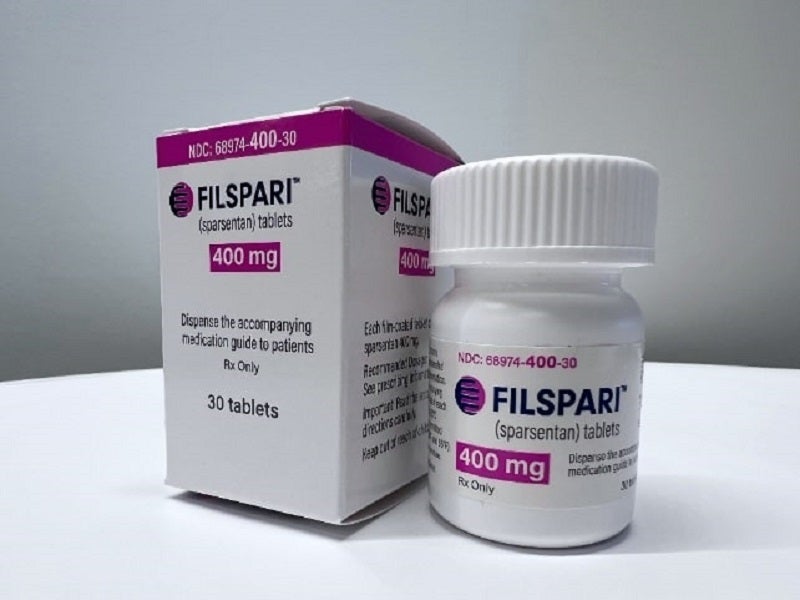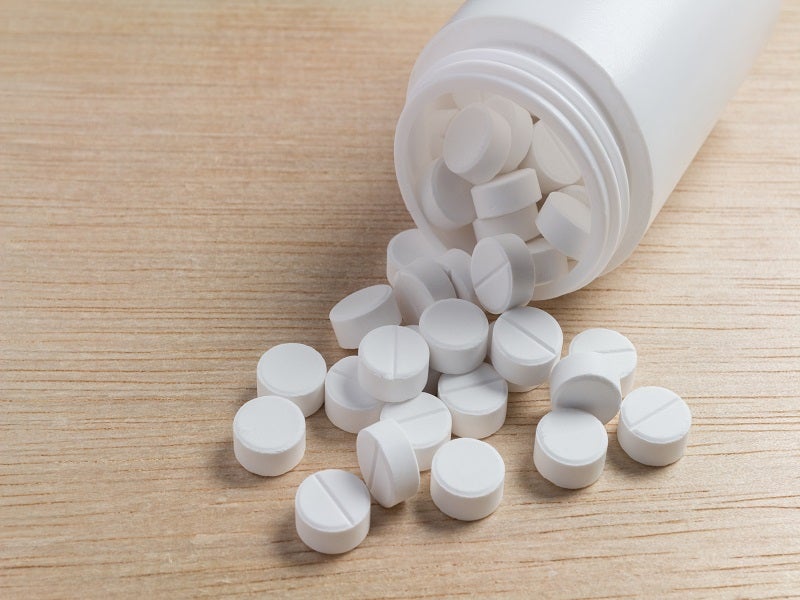Filspari (sparsentan) is a first-of-its-kind once-daily, oral non-immunosuppressive therapy indicated for reducing urine protein levels (proteinuria) in adults with primary immunoglobulin A nephropathy (IgAN), who are at risk of rapid disease worsening with usually a urine protein-to-creatinine ratio (UPCR) equal to or more than 1.5g/g. IgAN is a progressive kidney disease.
Developed by the US-based biopharmaceutical companies Travere Therapeutics and partner Ligand Pharmaceuticals, Filspari is the first single molecule dual endothelin angiotensin II receptor antagonist (DEARA) that selectively targets the two critical pathways, namely endothelin-1 and angiotensin II, involved in the disease progression for treating the condition.
In September 2021, Travere granted Vifor Pharma (now CSL Vifor), a Swiss pharmaceutical company, the licence to commercially develop sparsentan in Europe, Australia, and New Zealand. Meanwhile, Travere maintained the rights to sparsentan in the US and the rest of the world.
Filspari is available as 200mg and 400mg white to off-white, film-coated, modified oval tablets.
Regulatory approval for Filspari
The US Food and Drug Administration (FDA) granted accelerated approval to Filspari, based on the interim data from the ongoing Phase III clinical trial PROTECT in February 2023.
The continued approval of Filspari will depend upon confirmation of the PROTECT study’s findings on whether the drug effectively slows the decline of kidney function. Results from the confirmatory endpoints in the PROTECT study are expected in the fourth quarter of 2023.
A decision on the commercialisation of the drug in Europe for the treatment of IgAN is also pending with the European Medicines Agency (EMA), which is expected in the second half of 2023.
Travere is expected to submit a supplemental new drug application (NDA) to the FDA and a subsequent variation to the conditional marketing authorisation (CMA) application in Europe for sparsentan for the treatment of focal segmental glomerulosclerosis (FSGS), based on the results from the two-year primary efficacy endpoints in the ongoing Phase III DUPLEX study by the end of 2023.
The drug also holds orphan drug designation for the treatment of IgAN and FSGS in the US and Europe.
IgA nephropathy causes and symptoms
Also called Berger’s disease, IgA nephropathy is a rare kidney disease where immunoglobulin A (IgA), a protein that helps the body in fighting infection, accumulates in the kidneys. The accumulation disrupts the kidney’s typical filtering processes, resulting in symptoms such as blood in the urine (haematuria), proteinuria, and a gradual decline in kidney function.
Additional indications of IgAN include swelling, pain in one or both sides of the back below the ribs, recurrent upper respiratory infections, intestinal disease, swelling (oedema) in hands and feet, low fever, and elevated blood pressure.
The symptoms of IgAN may not appear in the early years and can go unnoticed for many years. Symptoms most often appear before the age of 40 years.
IgAN is the most common form of primary glomerulonephritis globally and is a primary contributor to kidney failure arising from glomerular disease, affecting 150,000 people in the US. It also ranks among the most prevalent glomerular diseases in Europe and Japan.
Filspari’s mechanism of action
Sparsentan is a small molecule with antagonism of the endothelin type A receptor (ETAR) and the angiotensin II type 1 receptor (AT1R). Sparsentan has a high affinity for the ETAR and the AT1R and more significant than 500-fold selectivity for these receptors over the endothelin type B and angiotensin II subtype 2 receptors.
Endothelin-1 and angiotensin II are believed to contribute to the pathogenesis of IgAN through the ETAR and AT1R, respectively. Sparsentan selectively binds to the receptors and blocks the corresponding pathways, reducing proteinuria in adults.
Clinical trials on Filspari
The FDA approval of Filspari was based on the clinically meaningful and statistically significant outcomes in proteinuria compared to irbesartan, an active comparator, in the pivotal PROTECT clinical trial, the largest head-to-head interventional study in IgAN to date.
The PROTECT is a global, randomised, multi-centre, double-blind, active-controlled clinical trial to evaluate the safety and efficacy of 400mg of sparsentan compared to 300mg of irbesartan in 404 adults patients with IgAN and persistent proteinuria, regardless of being treated with angiotensin-converting enzyme (ACE) or angiotensin receptor blocker (ARB) therapies.
Patients were randomised to a 1:1 ratio to receive either 400mg Filspari once daily following 200mg once daily for 14 days or 300mg irbesartan once daily following 150mg once daily for 14 days.
The primary endpoint of the study was the relative change from baseline in UPCR at week 36.
At 36 weeks, patients receiving sparsentan achieved a mean reduction of 49.8% in proteinuria from baseline compared to a mean reduction of 15.1% in patients treated with irbesartan.
Subsequently, the patients will continue in a blinded manner in the PROTECT study to complete the evaluation of the treatment effect on the estimated glomerular filtration rate (eGFR) slope over 110 weeks in the confirmatory endpoint analysis.
Filspari was well tolerated and consistent across all clinical trials conducted on it to date. The most common side effects reported in patients during the clinical trial were peripheral oedema, hypotension, dizziness, hyperkalaemia, and anaemia.





